- Serbia
Get to know Serbia
- Citizens
Culture and science
Health services
Pension and disability insurance
- Business
Employment
Economy
- Media
- Government
- Contact
Keep in touch
Contact form
Back
Keepin touch
Whether you have a question, comment, suggestion or any problem in the purview of the government, send us your message and we will try to respond as soon as possible. If your problem is not in our purview, we will forward your message to the relevant institution.
Q:
A:
EU Council of Ministers confirms positive feasibility study for Serbia-Montenegro
Belgrade/Luxemburg,
25 April 2005
At today’s session in Luxemburg, the EU Council of Ministers supported the favourable conclusion of the European Commission on Serbia-Montenegro’s readiness to enter into negotiations with the EU on concluding the agreement on stabilisation and association. They invited the Commission to prepare for the beginning of those negotiations as soon as possible.
It was stated in the ministerial session conclusions that the EU Council of Ministers welcomes the assessment of the European Commission on Serbia-Montenegro’s readiness to negotiate on concluding the agreement on stabilisation and association with the EU, based on the two-track approach, confirmed in conclusions of October 11, 2004 at the EU ministerial meeting in Maastricht.
The conclusions included praise to Serbia-Montenegro for substantial progress and the Council of Ministers asked the European Commission to maintain that dynamic by submitting draft negotiating directives as swiftly as possible.
The Council, made up of the foreign ministers from the 25 EU member states, confirmed that the EU wishes to enter into negotiations on concluding the agreement on stabilisation and association with Serbia-Montenegro as soon as possible.
As underlined in the conclusions of the session, the EU Council of Ministers reaffirmed its commitment to a strengthened union of Serbia-Montenegro, based on the Constitutional Charter, and called on the state union and its two member states to continue with the necessary reforms without fail, keeping in mind the points raised in the European Commission’s report, which is an elaboration of the feasibility study that was submitted to EU foreign ministers.
The Council welcomed the political agreement on constitutional amendments regarding direct elections to the state union parliament and called upon the competent parliaments to ratify this agreement without delay, it was underlined in the adopted conclusions.
The EU foreign ministers also supported the European Commission’s intention to strengthen discussions with authorities in Serbia-Montenegro as part of the enhanced permanent dialogue, in order to offer support to the current reform process and efforts made by Serbia-Montenegro before the formal beginning of negotiations and throughout the subsequent process.
The EU Council of Ministers emphasised in today’s announcement that the speed at which Serbia-Montenegro, like other West Balkan countries, moves closer to the EU depends on how quickly the state union and its two member states adopt and implement the necessary reforms, conform to the political parameters from Copenhagen and fulfil the requirements of the stabilisation and association process, including full cooperation with the International Criminal Tribunal for the former Yugoslavia (ICTY) in The Hague.
Recalling UN Security Council Resolutions 1503 and 1534, the Council of Ministers expects the latest improvements in cooperation with the ICTY to continue and be further strengthened, until all Hague indictees who have evaded international justice are brought before the court in The Hague, it was stated in the announcement.
It was explained at the EU foreign minister’s session that the Council of Ministers took note of the European Commission’s communication on the European future of Kosovo-Metohija and once again confirmed its long-term European prospects and the importance of implementing standards.
The conclusions included praise to Serbia-Montenegro for substantial progress and the Council of Ministers asked the European Commission to maintain that dynamic by submitting draft negotiating directives as swiftly as possible.
The Council, made up of the foreign ministers from the 25 EU member states, confirmed that the EU wishes to enter into negotiations on concluding the agreement on stabilisation and association with Serbia-Montenegro as soon as possible.
As underlined in the conclusions of the session, the EU Council of Ministers reaffirmed its commitment to a strengthened union of Serbia-Montenegro, based on the Constitutional Charter, and called on the state union and its two member states to continue with the necessary reforms without fail, keeping in mind the points raised in the European Commission’s report, which is an elaboration of the feasibility study that was submitted to EU foreign ministers.
The Council welcomed the political agreement on constitutional amendments regarding direct elections to the state union parliament and called upon the competent parliaments to ratify this agreement without delay, it was underlined in the adopted conclusions.
The EU foreign ministers also supported the European Commission’s intention to strengthen discussions with authorities in Serbia-Montenegro as part of the enhanced permanent dialogue, in order to offer support to the current reform process and efforts made by Serbia-Montenegro before the formal beginning of negotiations and throughout the subsequent process.
The EU Council of Ministers emphasised in today’s announcement that the speed at which Serbia-Montenegro, like other West Balkan countries, moves closer to the EU depends on how quickly the state union and its two member states adopt and implement the necessary reforms, conform to the political parameters from Copenhagen and fulfil the requirements of the stabilisation and association process, including full cooperation with the International Criminal Tribunal for the former Yugoslavia (ICTY) in The Hague.
Recalling UN Security Council Resolutions 1503 and 1534, the Council of Ministers expects the latest improvements in cooperation with the ICTY to continue and be further strengthened, until all Hague indictees who have evaded international justice are brought before the court in The Hague, it was stated in the announcement.
It was explained at the EU foreign minister’s session that the Council of Ministers took note of the European Commission’s communication on the European future of Kosovo-Metohija and once again confirmed its long-term European prospects and the importance of implementing standards.
-
 Belgrade, 4 January 2026
Belgrade, 4 January 2026Violation of UN Charter has become dominant principle of contemporary politics
-
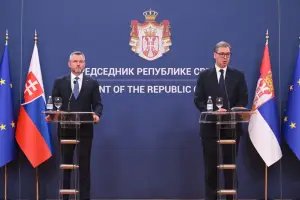 Belgrade, 21 December 2025
Belgrade, 21 December 2025Strengthening cooperation with Slovakia in many areas
-
 Belgrade, 21 December 2025
Belgrade, 21 December 2025President of Slovakia ceremonially welcomed in front of Palace of Serbia
-
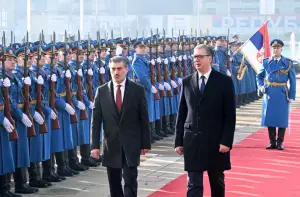 Belgrade, 18 December 2025
Belgrade, 18 December 2025Vučić welcomes President of Georgia in front of Palace of Serbia
-
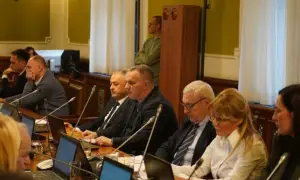 Belgrade, 15 December 2025
Belgrade, 15 December 2025Serbia needs strong, stable education system
-
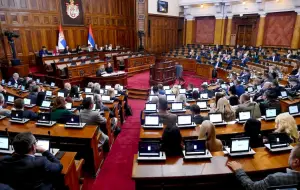 Belgrade, 3 December 2025
Belgrade, 3 December 2025Parliament adopts 2026 budget
-
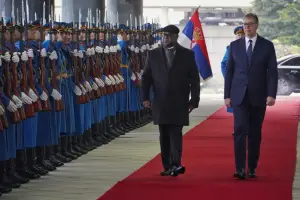 Belgrade, 28 November 2025
Belgrade, 28 November 2025Serbian President welcomes President of DR Congo
-
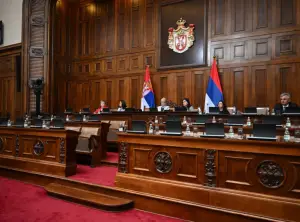 Belgrade, 7 November 2025
Belgrade, 7 November 2025Parliament adopts multiple laws
-
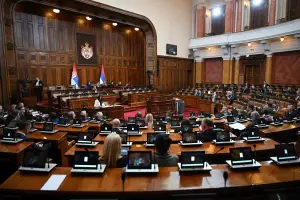 Belgrade, 22 October 2025
Belgrade, 22 October 2025Parliament adopts several laws, ratifies multiple international agreements
-
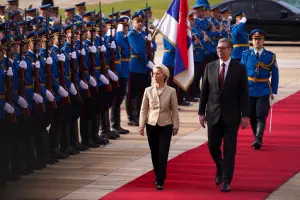 Belgrade, 15 October 2025
Belgrade, 15 October 2025Vučić welcomes Ursula von der Leyen in front of Palace of Serbia

